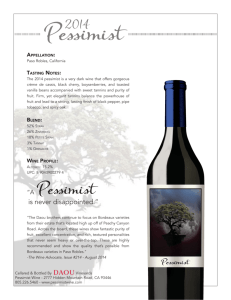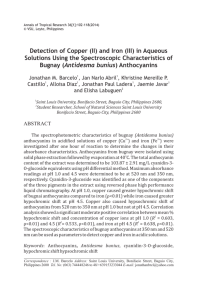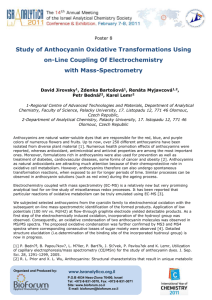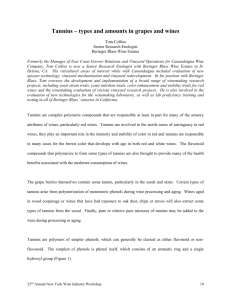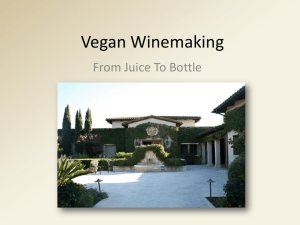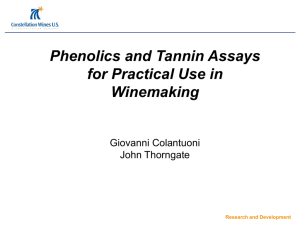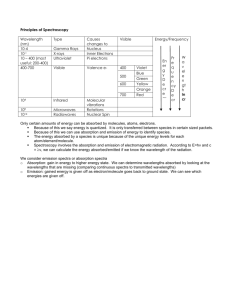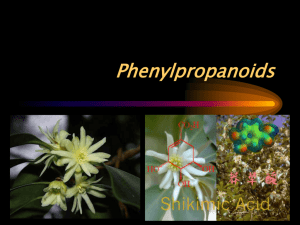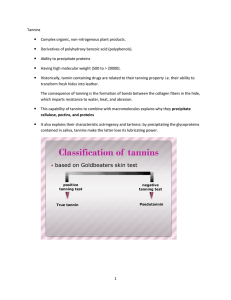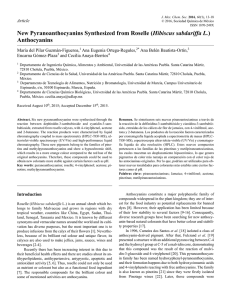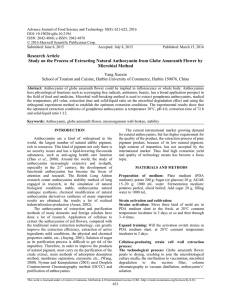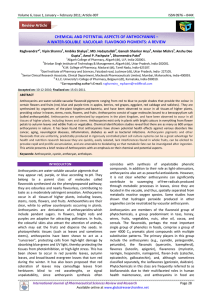pre-fermentation seminar
advertisement
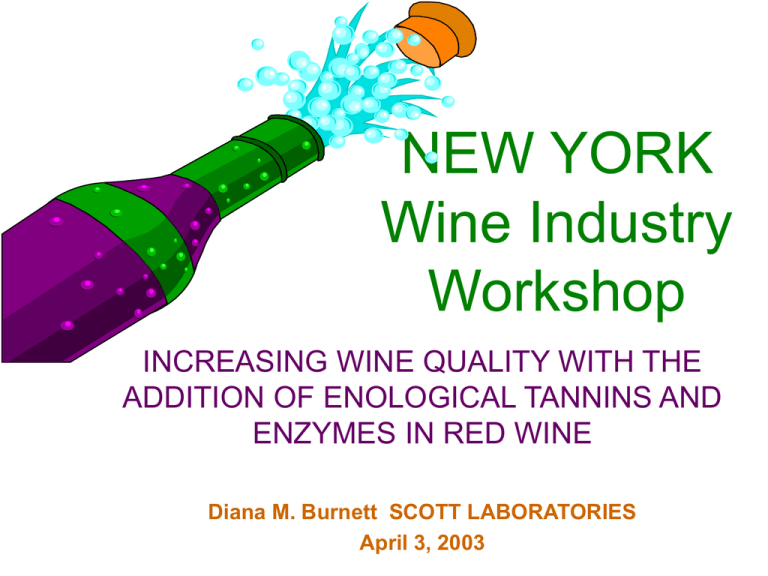
NEW YORK Wine Industry Workshop INCREASING WINE QUALITY WITH THE ADDITION OF ENOLOGICAL TANNINS AND ENZYMES IN RED WINE Diana M. Burnett SCOTT LABORATORIES April 3, 2003 Diana has been in the wine industry since her graduation from Fresno State more than twenty-five years ago. She owns two vineyards in Sonoma County, and is producing small lots of old vine Zinfandel from her Dry Creek ranch. She worked in winemaking for Geyser Peak, Rodney Strong and Beaulieu then spent ten years in marketing for Franciscan, Chalk Hill and Beringer. She is currently fermentation sector manager for Scott Labs and just prior to that taught several different enology classes at Fresno State. Her current position allows her to travel to wine regions through out the US and Europe continuing to learn and teach. Increasing Phenolic Structure • Color Enzymes for Reds • Fermentation Enological Tannins – Scottzyme Color Pro – Biotan-grape only – Scottzyme Color X – VR Supra – Laffort Lafase He • Post Fermentation – Laffort Lafase He GC Tannins • Opti RED – Tan’ Cor – autolysed yeast,high in polysaccharides, to increase color and mouthfeel in red wines – Tan’Cor Grand Cru • “Final Seasoning” – Quertanin – Tanin Plus Phenolics • Condensed Tannins (Proanthocyanins) – Grapes (skins and seeds) – exotic wood • Ellagic Tannins-Wood – Chestnut – Oak • Gallotannins – Gall nuts from oak-white “fluffy” tannins Galalcool and Galalcool SP - white wines Two Families of Tannins Hydrolysable tannins Gallotannins Condensed tannins Ellagitannins Proanthocyanidic tannins O HO HO HO COOH OH O-C OH HO OH HO C-O OH O Gallic ac. O HO Ellagic ac. OH OH flavan-3 ol The Tannin-Anthocyanin Bond OH In wine the anthocyanins are mainly bound to the proanthocyanidic tannins. Proanthocyanidic tannin - HO OH O - q, H+, no O2 + OH R1 R OH Preferential route during alcoholic fermentation - HO O R2 O2, H+, Fe+++ - O-Glu + CH3 CH Ethanal - OH OH Anthocyanin Role of the tannins in the winemaking Add structure to the wine Stabilization of the anthocyanins Anti-oxidative Elimination of protein Elimination of the reductive flavors Complexation of the iron Antiseptic BM / 9740 Analyzing Color and Phenolics • • • • • • • • • Anthocyanins Color Absorbance @420/520 Co-pigmentation Phenols-Flavonoid and non-flavonoid Phenolics, Total or Malvidin Diglucoside Phenol Maturity Index Tannin Phenolic Profile Color Profile Graphic Presentation of Phenolic Information gallic acid polymeric anthocyanins monomeric anthocyanins 200% catechin 150% 100% epicatechin 50% 0% polymeric phenols malvidin quercetin aglycone quercetin glycosides caftaric acid caffeic acid address Analyses Reported 29 January 1997 E T S Laboratories 123456 Sample ID gallic acid 200% Red Wine Phenolic Report polymeric anthocyanins catechin 150% 100% monomeric anthocyanins epicatechin 50% 0% polymeric phenols malvidin quercetin aglycone caftaric acid quercetin glycosides caffeic acid Sample ID gallic acid (mg/l) catechin (mg/l) epicatechin (mg/l) polymeric phenols (mg/l) 20 106 69 615 Reference total anthocyanins (mg/l) malvidin glucoside (mg/l) monmeric anthocyanins (mg/l) polymeric anthocyanins (mg/l) 359 215 309 50 Phenol Management - Indicator Compounds Polymerization Oak polymeric anthocyanins monomeric anthocyanins Seed Extraction gallic acid 200% catechin 150% 100% epicatechin 50% 0% polymeric phenols malvidin Glycoside Hydrolysis quercetin aglycone quercetin glycosides Grape Sun Exposure caftaric acid caffeic acid Oxidation Esterase Activity Tasting 1. 2. 3. 4. 5. Scott Laboratories Contact me at dianab@scottlab.com
